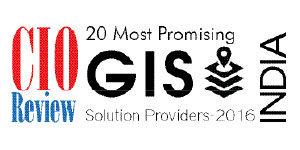 It is predicted that by 2020, the location-based service market will become a $1.3 trillion industry globally and use of geo-location data will generate $500 billion in consumer value. Geospatial information is central in all domains ranging from movement of weather patterns to traffic management in crowded cities to location-based services to forming the backbone for Internet of Things. There is a clear need to leverage the real time geospatial Big Data for workflow optimization across various industry verticals. Trimble Navigation Limited focuses on this workflow optimization and helps businesses from different verticals transform their business processes. “We offer end to end geospatial solutions that transform the entire workflow of an organization by connecting all stages in real time and increasing the level of collaboration, which results in multifold increase in efficiency and reduction in cost of the organization,” says Rajan Aiyer, Managing Director, Trimble India.
It is predicted that by 2020, the location-based service market will become a $1.3 trillion industry globally and use of geo-location data will generate $500 billion in consumer value. Geospatial information is central in all domains ranging from movement of weather patterns to traffic management in crowded cities to location-based services to forming the backbone for Internet of Things. There is a clear need to leverage the real time geospatial Big Data for workflow optimization across various industry verticals. Trimble Navigation Limited focuses on this workflow optimization and helps businesses from different verticals transform their business processes. “We offer end to end geospatial solutions that transform the entire workflow of an organization by connecting all stages in real time and increasing the level of collaboration, which results in multifold increase in efficiency and reduction in cost of the organization,” says Rajan Aiyer, Managing Director, Trimble India.Trimble started as a GPS company 38 years ago but today its business bestrides Engineering and Construction, Transportation and Logistics, Agriculture, and other emerging geospatial industries. The company has grown at a frenetic pace in the past 17 years and this growth has been realized through both organic and inorganic methods, with 65 companies being acquired in the past decade. In India, it employs about 750 employees and is supported by a network of partners and distributors. It is focusing upon the huge opportunity in India, which includes large projects like Smart Cities, Digital India, Land Administration, Inland Waterways, Agriculture, Telematics etc. “Large consigners across verticals such as automotive, cement, petro-chemicals, logistics, e-commerce etc. use our telematics solutions to optimize timely delivery of products with minimal delays and maximum vehicle utilization. Our focus on agriculture will improve India’s farm productivity via precision
agriculture. For land administration, we work with government agencies to digitize land records, ensure problem-free titling and enable real time land acquisition for infrastructure projects. In construction, we ensure timelines are met with reduced cost and rework. The common theme is “Do More with Less” in the Big Data industries, adds Rajan. Trimble believes that India needs a robust, real-time geographic information system wherein collecting, managing and analyzing Big Data will facilitate transformation of business processes and impact productivity and efficiency of projects. Constructable models enable cost-efficient, better and faster building construction. “Our software is widely used to engineer a 3D model, and even before a building is built, using Trimble solutions, our customers collect, process, and analyze complex data in real time to deliver as-built models for construction. Our solutions are used in multiple industries like railways, road, construction, mining, airports and disaster management, and amongst others,” explains Rajan.
Trimble’s portfolio already includes 2500+ patents and it’s augmenting its organic product development with strategic acquisitions to bring the latest positioning technologies to market. It has acquired many companies like TATA Telematics, Tekla, and SketchUp in the past decade, which has fueled its growth to a $2.3 billion company. Trimble’s future road map is centered on applying technology to transform the way the world works. Safe, environment friendly, economically viable, productive and efficient industries are at the center of Trimble’s vision. “We hope that by 2020 we will make significant progress towards the achievement of our vision, with geospatial capabilities at the center of our strategy,” signs off Rajan.

Trimble Navigation Limited focuses on this workflow optimization and helps businesses from different verticals transform their business processes
Trimble’s portfolio already includes 2500+ patents and it’s augmenting its organic product development with strategic acquisitions to bring the latest positioning technologies to market. It has acquired many companies like TATA Telematics, Tekla, and SketchUp in the past decade, which has fueled its growth to a $2.3 billion company. Trimble’s future road map is centered on applying technology to transform the way the world works. Safe, environment friendly, economically viable, productive and efficient industries are at the center of Trimble’s vision. “We hope that by 2020 we will make significant progress towards the achievement of our vision, with geospatial capabilities at the center of our strategy,” signs off Rajan.






